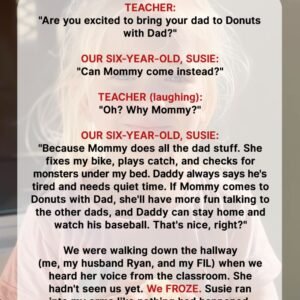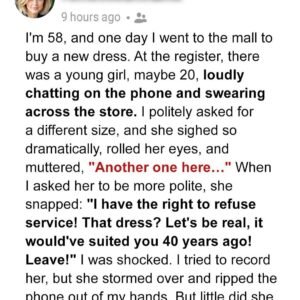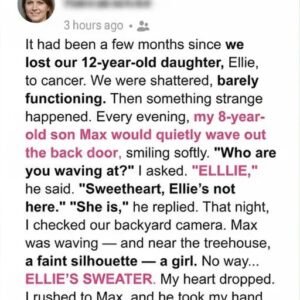Margaret Cole, sixty-two, stood frozen, her trembling hands clutching the hem of her apron. In front of her stood Lena Parker, her daughter-in-law — tall, sharp-tongued, and furious.
Margaret had tried for months to keep peace in the house she’d built with her late husband. Her son, Andrew, had married Lena two years ago, and at first, things seemed fine. But slowly, Lena began making decisions for both of them — what Andrew wore, how he spent his money, and even how often he visited his mother.
This morning, Lena’s anger had reached a breaking point.
“Give me the house keys, Margaret,” Lena snapped, stepping closer. “Andrew and I are going to renovate. It’s time for you to move somewhere… quieter.”
Margaret blinked. “This is my house, dear. I’ve lived here for forty years.”
“Exactly,” Lena spat. “Forty years is long enough. Let us have our turn.”
Margaret tried to keep her voice calm. “You and Andrew agreed we’d all stay here until you found your own place.”
Lena’s face twisted. “He agreed because you manipulated him! You make him feel guilty, like he owes you his life.”
Margaret’s eyes filled with tears. “That’s not true. I just love my son—”
Before she could finish, Lena stepped forward and slapped her. The sound cracked through the quiet morning. Margaret gasped, stumbling backward, her hand to her cheek.
“You’re pathetic!” Lena shouted. “Always acting like the victim. You’ve done enough—just get out!”
And then—
The front door opened.
Andrew stood frozen on the doorstep, still in his office jacket, his briefcase in hand. His face went pale as he took in the scene: his mother, red-faced and crying, and his wife, her hand still midair.
“Lena…” he whispered, his voice trembling. “What did you just do?”
Lena’s hand dropped. “Andrew—it’s not what it looks like—”
But Andrew was already moving forward, his jaw clenched, eyes blazing. “Did you just hit my mother?”
Lena stammered, “She was provoking me! You don’t understand—”
Andrew’s voice rose, sharp as glass.
“Enough.”
The air turned heavy. Margaret could barely breathe.
For the first time, her son’s anger wasn’t directed at her — it was at the woman he once promised to protect.
Andrew helped his mother sit down, his hands shaking as he reached for a towel. The red mark on her cheek was impossible to ignore.
“Mom, are you hurt?” he asked softly.
“I’m fine,” Margaret whispered, though her voice trembled. “It was just a misunderstanding.”
But Andrew wasn’t convinced. He turned to Lena, his expression cold. “You hit her. Don’t you dare say it was nothing.”
Lena’s eyes filled with tears. “You’re making this bigger than it is! She’s always in our way, Andrew. She watches us, corrects me, judges everything I do!”
Andrew took a deep breath, forcing himself not to shout. “This is her home. We’re guests here — both of us.”
Lena scoffed. “Guests? You’re her son! You act like she owns your life.”
Andrew stood up straight. “She doesn’t own my life, Lena. But she gave it to me. And you just disrespected the person who made everything possible for us.”
Lena turned away, pacing. “I can’t live like this. I feel suffocated!”
“Then maybe,” Andrew said quietly, “you should leave for a while.”
Lena froze. “You’re throwing me out?”
“I’m asking you to take time,” he said firmly. “Think about what you’ve done. Because right now, I can’t even look at you without feeling ashamed.”
Tears streamed down her face. “You’re choosing her over me.”
Andrew shook his head. “I’m choosing what’s right.”
Lena grabbed her bag and stormed out, slamming the door so hard the windows rattled. The silence afterward felt suffocating.
Margaret looked at her son, her eyes full of sadness. “You didn’t have to do that, Andrew.”
“Yes, I did,” he said, rubbing his temples. “I should’ve stopped this months ago.”
He sat beside her, and for the first time in years, she saw how exhausted he looked — like a man torn between two worlds.
In the days that followed, the house grew quiet. Andrew stayed home from work for a week, helping his mother cook, talking little but always staying close.
Each night, he stared at the empty chair across the table. He still loved Lena, but the image of that slap haunted him.
Three weeks passed before Lena called.
Andrew answered on the third ring, his tone cautious. “Lena.”
Her voice cracked. “Andrew… I’ve been seeing a therapist. I know what I did was unforgivable, but I want to make it right.”
Andrew said nothing for a long time. Then quietly: “Come talk to Mom. Not me.”
That Sunday, Lena arrived. Margaret opened the door, surprised to see the once-defiant woman now standing small, her eyes red and tired.
“Mrs. Cole,” Lena whispered. “I’m sorry. I was angry, jealous, and I let my pride destroy everything. I can’t take back what I did, but I’ll do anything to earn forgiveness.”
Margaret studied her for a long moment. Then she said softly, “You don’t need to earn forgiveness, Lena. You only need to understand why it matters.”
Tears rolled down Lena’s cheeks. “I was scared—scared of losing Andrew to the past, scared that I’d never belong in this house.”
Margaret reached out, touching her shoulder gently. “Dear, family isn’t about territory. It’s about trust. I forgive you — not because I forgot, but because I believe people can grow.”Family travel packages
When Andrew came in, he found them sitting at the kitchen table — the same table where everything had fallen apart weeks ago.
“Lena,” he said quietly, “if you come back, things must change. This house stays Mom’s. Respect is non-negotiable.”
Lena nodded, eyes steady. “I understand.”
Months passed. The healing wasn’t quick, but it was real. Lena began helping Margaret around the house, listening instead of reacting. Andrew watched the two women — once at war — now sharing tea in the garden, and he finally felt peace returning.
One evening, as the sun set, Margaret looked at her son and daughter-in-law and smiled. “We almost lost each other,” she said. “But sometimes, pain is what teaches us to hold on better.”
Andrew reached for his mother’s hand. “And to let go of the rest.”
That night, for the first time in a long while, their home felt like a home again — not because of walls or keys, but because forgiveness had opened the door wider than anger ever could.





